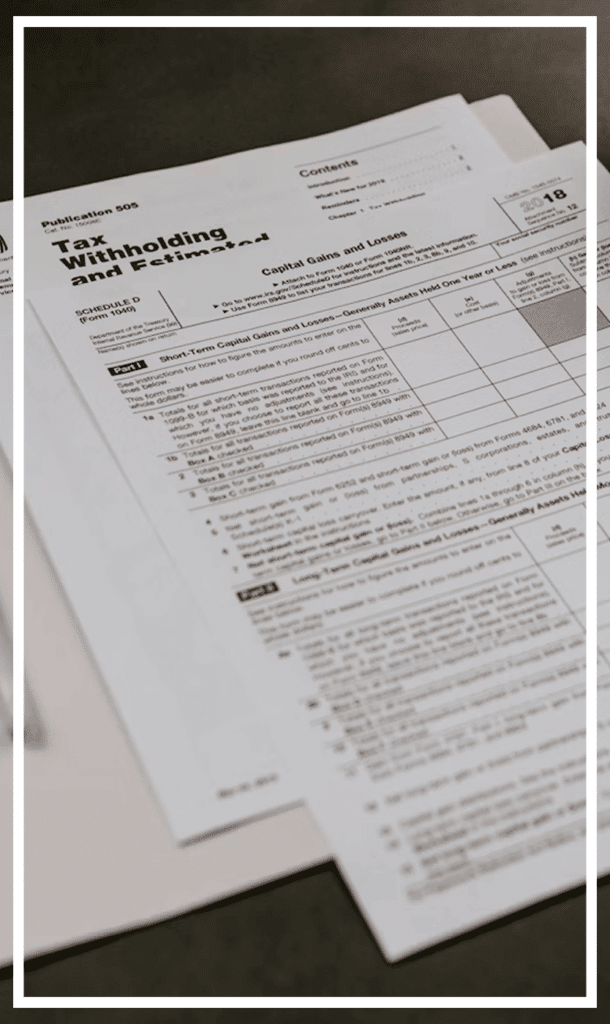North Carolina Divorce Tax Laws
How Are Taxes Affected by Divorce in North Carolina?
In North Carolina, the interplay of state tax laws, federal tax rules, and local property taxation can create significant traps (or opportunities) during and after a divorce. If you live in Wake, Durham, Orange, Chatham, or Johnston counties, you’ll also need to be aware of local property tax burdens, assessment practices, and how assets are divided in your county courts.
Let’s look at what changes in your tax status post-divorce, how property division works (and its tax consequences), how alimony and child support are handled, and special local considerations for the Triangle area.
Tax Filing Status & Dependents After Divorce
One of the first and most visible impacts of divorce is the change in your federal (and state) tax filing status. The entry of your absolute divorce impacts whether you can file jointly with your spouse or single. Your marital status as of the last day of the year determines how you can file for that year.
You will only change your filing status starting with the tax year in which you became legally divorced in North Carolina. For instance, if you are divorced as of December 30th, 2025, you can then file as single for tax year 2025. If you are not divorced but married as of the last day of the year, your options will generally be married filing jointly or married filing separately.
Married Filing Jointly v. Married Filing Separately
There can be an overall tax advantage to filing jointly depending on the income and withholding of both spouses. It is important to talk to a CPA or tax professional to determine the best option. Keep in mind when you sign a return married filing jointly with your spouse the taxing authority can hold either of you liable for the taxes owed so it is very important to include tax provisions in your North Carolina Separation Agreement and Property Settlement.
Tax Filing Status with Children
After your absolute divorce is entered, your filing status will change. However, if you also have children then you could qualify for a special tax status. Your options for filing are either as Single or Head of Household (HoH) depending on whether or not you have children and if you pay more than half the cost of maintaining the home. Filing as HoH comes with a higher standard deduction and more favorable tax brackets, so it can often be preferred.
Claiming Children as Dependents & Child Tax Credits
The parent with whom the child resides for more than half the year will get to claim the child as a dependent and receive all associated benefits like child tax credits. However, it’s possible for the parent with less custody time to receive these benefits if the parent with primary custody puts this in writing in a separation agreement.
As far as child support is concerned, the parent paying child support cannot deduct these payments from their taxes. Similarly, the parent receiving payments is not expected to pay taxes on them. When parents share custody equally it is very important to reach an agreement regarding the child dependency exemptions in your North Carolina Separation Agreement or Custody Agreement.
Alimony & Spousal Support and Tax Treatment in North Carolina
In North Carolina, as in other U.S. states, whether alimony is deductible or taxed depends heavily on when the divorce is finalized.
- For divorces finalized before January 1, 2019, alimony (spousal support) is generally deductible by the payer and taxable income to the recipient (subject to IRS rules).
- For divorces finalized after December 31, 2018, federal tax law changed: alimony payments are no longer deductible by the payer and no longer taxable to the recipient.
Division of Assets, Capital Gains & Retirement Accounts
Transfers between spouses (during divorce)
Under federal tax rules (IRC § 1041), transfers of property between spouses as part of a divorce settlement are generally non-taxable events. That means you can transfer real estate, investment accounts, or other assets between spouses without triggering immediate taxes, provided it is incident to and prior to divorce.
While the transfer itself is tax-free, the sale of the asset is not. A capital gains tax based on original cost basis may be triggered if a transferred asset is sold. Also, when negotiating a Property Settlement, it is wise to consider the imbedded tax consequences of each asset. A North Carolina divorce attorney can provide advice on how to avoid unnecessary tax surprises after the signing of an agreement.
Home & Real Property
If the marital home is sold, you may be eligible for the capital gains exclusion: up to $250,000 (if single) or $500,000 (if joint) of gain is excluded, subject to occupancy and use tests. To qualify, you generally must have lived in the home as your principal residence for 2 of the preceding 5 years.
If the home is transferred to one spouse (instead of sold), the tax issues are deferred until a future sale.
Retirement Accounts & Pensions
Retirement assets like 401(k), pensions, and IRAs have certain tax consequences if money is withdrawn. At time of divorce we can transfer funds without tax burdens using a special North Carolina court order called a Qualified Domestic Relations Order (QDRO). This allows couples to avoid tax penalties that they would otherwise incur when dividing these accounts. Without one, a transfer might be considered a withdrawal and be subject to taxes and penalties.
Handling Joint Tax Liabilities & Past Returns
While divorce affects future taxes, many couples leave behind joint liabilities or past year issues. For instance, if you filed joint returns while married and owe taxes, both spouses may remain jointly and severally liable, even after divorce. The IRS can pursue either spouse. In some cases, one spouse may request Innocent Spouse Relief or Separation of Liability Relief to limit exposure if the other spouse’s errors caused the liability.
It’s wise to address these issues in your divorce settlement: agreeing who takes responsibility for past tax debts (or requiring indemnification) can prevent future conflict.
Local & County Issues: Wake, Durham, Orange, Chatham & Johnston Counties
While the federal and state tax rules are the same across North Carolina, the local context in your county can affect the burden or strategy:
Property Taxes & Assessments
Property taxes are assessed and collected at the county level. Each county sets its own rates, valuation methods, and schedules. For 2025, median property tax rates vary by county. For instance:
- Wake County: median property tax is about $1,793 on a median-valued home (≈ 0.78%)
- Orange County: among the highest in the state, approximately $2,829
- Durham County: another high median with a $2,001 average tax
- Chatham County: $1,413 is the median property tax here
- Johnston County: on the lower end with a $1,128 average tax on median homes
If one spouse receives the home in the divorce, that person assumes ongoing property tax burden. In counties with higher rates (like Orange), that becomes a material expense. As part of your settlement, you may negotiate that the other spouse help cover a share of property tax burdens (especially pending a sale).

North Carolina Tax Resources
- Divorce and Tax Overview
- 9 Biggest Tax Consequences of Divorce
- Common Financial Mistakes Made in Divorce
- 4 Things You Must Know About Divorce and Taxes
Divorce Issues and Taxes Resources
Other Financial Divorce Resources
- Financial Planning for Divorce: A Guide to Everything to Consider
- How to Protect Your Estate During Divorce
- Uncovering Hidden Assets During Divorce
- The Most Frequently Asked Alimony Questions
- Impact of 2018 Tax Code Changes on Alimony
- I Need More Alimony From My Spouse
- Divorce Concerns For Couples with High Net Worth
- Executive and High Asset Divorce
- What You Need to Know About Child Support in North Carolina
- Child Support and Extra Expenses: Who Pays?
- How is Child Support Calculated if a Parent is Self-Employed?
- Can I Change My Child Support Agreement?
Helpful Divorce Tools
North Carolina Local Resources
Resources for all areas of the Raleigh-Durham Triangle, including transportation, schools, medical help, forms, and specific local court information. View all resources for Raleigh, Durham, Cary, Chapel Hill, and Wake Forest.

Not sure where to start?
Sign up for our free video e-course. You will receive a daily video covering a specific topic you’ll need to address when going through your divorce. We take the mystery out of the process by breaking it down into easy to understand pieces.














